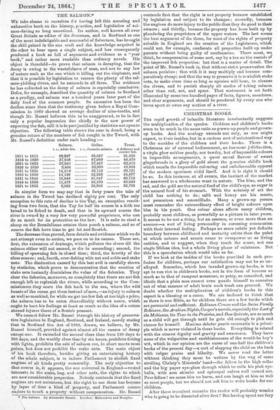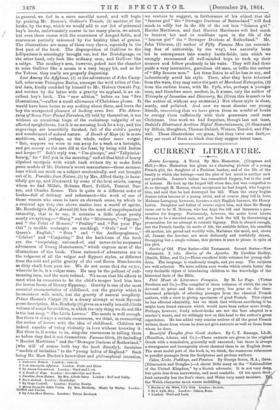CHRISTMAS BOOKS.
THE rapid growth of infantile literature involuntarily suggests the multiplication of the species. Children and children's books seem to be much in the same ratio as grown-up people and grown- up books. And the analogy extends not only, as one might expect, to their insides, but in a curious sort of unintentional way to the outsides of the children and their books. There is a Christmas air of external bedizenment, an innocent jollification, a virgin glow neither gaudy, nor tawdry, but of impossible colours in impossible arrangements, a queer moral flavour of sweet gingerbreads in a glory of gold about the genuine child's book which recalls the impossible colouring and unfathomable apparel of the modern specimen child itself. And it is right it should be so. In this instance, at all events, the instinct of the market has answered to a wholesome want in nature. The blue, and the red, and the gold are the natural food of the child's eye, as sugar is the natural food of his stomach. With the sobriety of art the child has nothing to do ; milk and honey are his meats, not pemmican and amontillado. Many a grown-up person must remember the extraordinary effect of bright colours upon him in his youth. One colour alone affects many children, probably most children, as powerfully as a picture in later years. It seems to be not a thing, but an essence, or even more than an essence—a sort of living personality in caressing communion with their internal feeling. Perhaps no more subtle yet definite boundary between childhood and maturity exists than the point at which colours and scents cease to overpower us as living entities, and to suggest, when they touch the sense, not one single lifeless idea, but a whole living phase of existence. But this is a speculation which would take us far.
If we look at the insides of the books provided in such pro- fusion for children, perhaps our satisfaction may not be so un- alloyed. Sensation, which has invaded grown-up books, is too apt to run riot in children's books, not in the form of horrors so much as in that of rampant nonsense, so petty, so conceited, and idiotic that a plain man cannot even puzzle himself to conceive out of what manner of adult brain such trash can proceed. We doubt whether the multiplication of children's books in this aspect is a blessing or a curse. We are inclined to think that as there is one Bible, so for children there are a few books which are perennial and sufficient. Robinson.Crusoe and the Swiss Family Robinson, the Arabian Nights, Cooper's novels, especially the Last of the Mohicans, his Tour in the Prairies, and Don Quixote, are as much as a child will get through until he gets old enough to pick and choose for himself. Maxima debetur pueris reverentia is a princi- ple which is never violated in these books. Everything is related with the utmost dignity and gravity and sweetness. They have none of the vulgarities and snobbishnesses of the would-be boy's wit, which in our opinion are the curse of one-balf the children's books of the present day—a sort of slapping the child on the back with vulgar praise and hilarity. We never read the latter without thinking they must be written by the wag of some strolling Christy's Minstrels' band—the fellow in the high collar and the big paper eye-glass through which lie rolls his pink eye- balls, with arm akimbo and episcopal calves well turned out. Poor fellow ! we mean him no harm, and can laugh at him as well as most people, but we should not ask him to write books for our children.
After these truculent remarks the reader will probably wonder who is going to be dissected alive first ? But having spent our fury
in general, we feel in a more merciful mood, and will begin by praising Mr. Beeton's Gulliver's Travels, (1) another of the books, by the way, which we would add to our list of perennial boy's books, unfortunately coarse in too many places, we admit, but even there coarse with the coarseness of dunged fields, and coarseness partially redeemed by the healthy blast of genius. The illustrations are many of them very clever, especially in the first part of the book. The disproportion of Gulliver to the Lilliputians is amusingly brought out, but the Brobdignags, on the other hand, only look like ordinary, men, and Gulliver like a midge. The monkey's arm, however, poked into the chamber to seize Gulliver like a mouse is a very happy hit, and as for the Yahoos, they really are properly disgusting.
Lost Among the Affghans, (2) or the adventures of John Camp- bell, otherwise Feringhee Bacba, amongst the wild tribes of Cen- tral Asia, kindly confided by himself to Mr. Hubert Oswald Fry, and written by the latter with a gravity we applaud, is an ex- cellent boy's book. The "new edition" before us has "five illustrations,"—rather a small allowance of Christmas plums. It would have been better to say nothing about them, and leave the boy the unexpected pleasure of finding even five. The Adven- tures of Seven Four-Footed Foresters, (3) told by themselves, is not without an occasional tinge of the cockahoop vulgarity of an affected sprightliness, but it is an amusing book for a boy, and the engravings are beautifully finished, full of the child's poetry and wonderment of animal nature. A Bunch of Keys (4) is more ambitious, and perhaps, on the whole, rather more vulgar. "Bob, suppose we were to run away for a week or a fortnight, and get money as the men did at the feast, by being wild Indian and keeper ?" Bob's reply was, " Um-glumps," and "Tellyinthe- bornig," for "Tell you in the morning," and all that kind of heavy slipshod rantipole with which hack writers try to make little paste models of Mr. Dickens's worst mannerisms—those manner. isms which are stuck on a subject mechanically, and not brought out of it. Parables from Nature, (5) by Mrs. Alfred Gatty, is beau- tifully got up, and illustrated by some of the best artists, among whom we find Millais, Holman Hunt, Frolich, Tenniel, Bur- ton, and Charles Keene. This is quite in a different order of books—full of delicacy and refinement—the work of one of those women who seem to have an eleventh sense, by which in a material age they rise above matter into a world of sphits. Mr. Routledge's Boy's Annual (6) has the merit of encycloptedical rotundity, that is to say, it contains a little about pretty nearly everything,—" Slang" and the "Microscope," "Pigeons" and " the Point of Honour," "Poultry" and "Put your Pipe Out" (a terrible onslaught on smoking), " Owls " and " the Queen's English," "Bees " and "the Anthropoglossos," "Cricket" and "Conjuring." But the back-bone of the book are the "surprising, unheard-of, and never-to-be surpassed adventures of Young Munchausen," which engross most of the illustrations of the book. These nnheard-of adventures are in the vulgarest of all the vulgar and flippant styles, as different from the cold and polite gravity of the real Baron Munchausen as dirty chalk from pure ice. We do not mean that the writer, whoever he is, is a vulgar man. He may be the politest of well- meaning men, and the most refined. We mean that his efforts to meet what he conceives to be the child's temper lead him into the lowest forms of literary flippancy. Gravity is one of the most essential characteristics of childhood, not the gravity which is inconsistent with mirth, but the gravity of natural simplicity. Prince Hassan's Carpet (7) is a dreary attempt at weak Byronic prose description. Mrs. Broderip (8) gives us a really beautiful little volume of songs for children, in which the only thing we do not like is the last song, "The Little Lovers." The music is well enough. But there is always a certain coarseness, we think, in connecting the notion of lovers with the idea of childhood. Children are indeed capable of being violently in love without knowing it. But there is, it seems to us, singular coarseness in telling them so before they find it out themselves. Famous Girls, (9) including "Harriet Martineau" and the "Dowager Duchess of Sutherland," (who will of course both buy the book directly), furnishes "models of imitation "to the "young ladies of England." Such being Mr. Maw Darton's benevolent and philosophical intention, 1 Gulliver's Travels. London: Penton.
2 Lost Among the Afghans. London: Smith and Elder.
3 By James Greenwood. London: Ward and Lw.k.
4 4 Bunch of Keys. London : Groombridge and Sons.
5 Parables from Nature. By Mn. Alfred Getty. London : Bell and Delay. 6 Boy's Annual. London : Rontiadge.
7 By Hope Luttrell. London : Denney Newby.
8 Merry Songs for Little Voices. By Mrs. Broder'''. Music by Nulty. London: Griffith end Ferran.
9 By John Maw Barton. London: Virtue Brothers,
we venture to suggest, in furtherance of his object, that the "famous girl" the "Dowager Duchess of Sutherland" will find much to edify her in the life of the not less "famous girl" , Harriet Martineau, and that Harriet Martineau will find much to interest, her and to meditate upon in the life of the "famous girl" the " Dowager Duchess of Sutherland." Mr.. John Tillotson, (1) author of Fifty Famous Men (an astound- ing feat of authorship, by the way), has naturally been led in consequence into sundry battle-fields, into which we strongly recommend all well-minded boys to tuck up their trousers and follow prudently in his wake. They will find their guide a very instructive, garrulous old man, as befits the author of" fifty famous men." Let them listen to all he has to say, and industriously avoid his style. Then, after they have returned from the wars, they may enter the path of Merchant Enterprize, (2) from the earliest times, with Mr. Fyfe, who, perhaps a younger man, and therefore more modest, is, it seems, only the author of Triumphs of Invention and Discovery, &c. (Even this is much to be the author of, without any etcsateras.) But whose style is clear, manly, and polished. And now we must dismiss our young friends, conceiving that we have given them an armful of books to occupy them sufficiently with their grammars until next Christmas. One work we had forgotten, though last not least, Dalziets Illustrated Arabian Nights' Entertainments, (3) illustrated by Millais, Houghton, Thomas Dalziel, Watson, Tenniel, and Pin- well. These illustrations are gems, but they have one fanit,— they are most of them so black that they suggest burnt toast.































 Previous page
Previous page